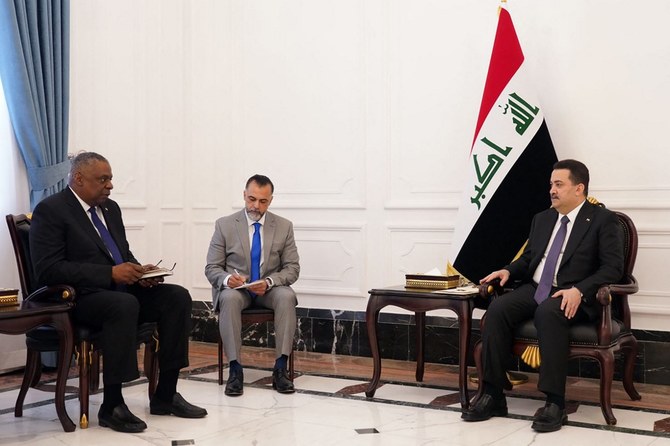
This week’s visit to the region by US Secretary of Defense Lloyd Austin comes at a delicate moment for both Israel and Iran. While the declared objective of the visit is to assure US regional allies of the strategic bond that Washington is committed to, there are other issues that cannot be ignored.
One is the fact that Israel is getting closer to embracing a plan to strike Iran’s nuclear facilities in a bid to derail Tehran’s suspected attempt to build a nuclear bomb. Another is the Israeli government’s callous mishandling of events in the occupied West Bank, which threatens to trigger a third intifada that neither the US nor its regional allies are ready to deal with.
For the first component, it is not clear if Austin’s visit to Jordan, Egypt and Israel is meant to prepare these countries for a possible strike against Iran or not. The Biden administration has declared that negotiations to resurrect the 2015 nuclear agreement with Iran are on hold for now. Tehran had sent messages that it was ready to resume talks, but so far Washington has shown no interest.
Meanwhile, the International Atomic Energy Agency has indicated that Iran has managed to enrich uranium to a purity beyond 80 percent, bringing it close to achieving a level that allows it to build a nuclear bomb. This prompted IAEA head Rafael Grossi to visit Tehran this week and reach new understandings with Iran. The exact understandings are not clear, as Grossi and the Iranians appear to differ on them. Iran says that the 80 percent-plus enrichment was done by mistake. That is hard to believe. But Grossi seems to be giving Tehran the benefit of the doubt — for now.
What we know is that Iran has been in breach of the 2015 nuclear deal since the US walked out of it. The IAEA and Iran have been at loggerheads regarding online cameras and other things since then. At one point, the two sides were close to reaching a deal, but non-nuclear issues, such as the designation of the Islamic Revolutionary Guard Corps, appeared to derail the talks.
It is not clear if Austin’s visit to Jordan, Egypt and Israel is meant to prepare these countries for a possible strike against Iran or not
Osama Al-Sharif
At no point did Israel support the resumption of talks with Iran. The return of Benjamin Netanyahu to the helm has exacerbated the situation. It is now clear that Israel is seriously considering launching a strike against Iranian nuclear sites. Where the US stands on this issue is the main question.
Grossi has warned that any strike would be illegal and Netanyahu was quick to denounce him. Austin’s visit will focus on the repercussions of a planned strike. Should the US be part of such an attack is a major point. The US has been pushing to integrate its allies’ air defense systems. That is a major move. Iran has the capacity to launch long-range missiles against targets in Israel. It has been supplying its proxy, Hezbollah, with rockets for years despite Israel’s strikes against Syrian targets purportedly associated with Iranian armaments.
The US will use diplomacy to contain Iran before any attack. It will probably go to the UN Security Council in an attempt to declare Iran in breach of Chapter 7 of the UN Charter. That could give Israel the pretext to launch a preemptive attack. But Iran is counting on Russia’s support. Apart from a veto at the UNSC, Tehran is also hoping to get its hands on Russia’s S-400 air defense system. That could be a game changer. Iran has been a major supporter of Russia’s military operation in Ukraine. Its drones have become a vital part of Moscow’s air campaign there.
If Israel is contemplating launching a strike against Iran any time soon, the window of opportunity is quickly closing. Austin’s visit will determine what the next step will be. The problem is not what a strike could do, but what the Iranian reaction could be. Iran has the capacity to open multiple fronts through its proxies. This is something that Israel and the US are yet to apprehend.
Meanwhile, Austin will almost certainly ask Netanyahu to keep the far-right ministers in his government in check. A conflagration in the West Bank during Ramadan is not what the US or its Arab allies want to see happening. The problem is that Netanyahu is no longer in control. Between the mass opposition to his judicial reforms and the runaway ministers like Bezalel Smotrich and Itamar Ben-Gvir, he appears to be out of touch and beholden to his extremist allies.
Whatever the real purpose of Austin’s visit, both standing up to Iran and pushing for calm in the West Bank are difficult missions. In these two cases, the US needs to tread carefully.
Osama Al-Sharif is a journalist and political commentator based in Amman. Twitter: @plato010











